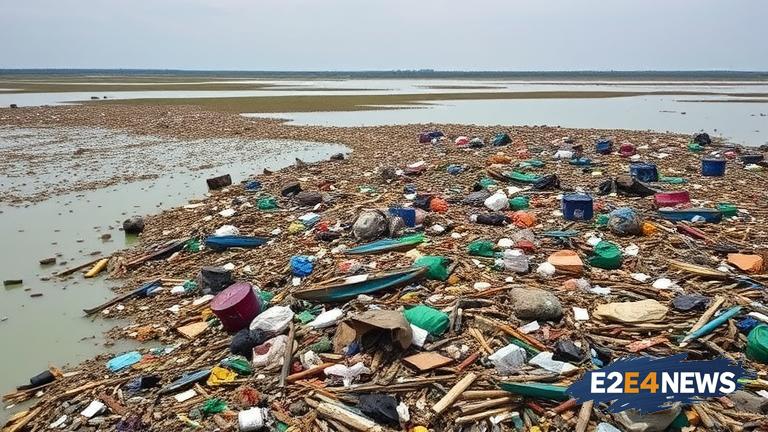A disturbing report has emerged, highlighting the deplorable state of Nigerian lagoons, which have been ranked among the world’s worst dumping sites. The report, which has sparked widespread concern, reveals the alarming levels of pollution and waste in the lagoons, posing significant environmental and health risks to the population. The lagoons, which are a vital part of Nigeria’s ecosystem, have been transformed into dumping grounds for all manner of waste, including plastic, industrial waste, and even human waste. The situation is exacerbated by the lack of effective waste management systems, leading to the proliferation of dumpsites and the degradation of the environment. The report notes that the pollution in the lagoons has reached crisis levels, with toxic chemicals and pollutants contaminating the water and soil. This has resulted in the destruction of aquatic life, with many species facing extinction due to the polluted environment. Furthermore, the pollution has also had a devastating impact on human health, with many communities surrounding the lagoons suffering from water-borne diseases and other health problems. The report highlights the need for urgent action to address the crisis, including the implementation of effective waste management systems and the enforcement of environmental regulations. The Nigerian government has been criticized for its lack of action in addressing the issue, with many calling for greater investment in environmental protection and conservation. The report also notes that the pollution in the lagoons is not only an environmental issue but also an economic one, with the degradation of the environment having a significant impact on the local economy. The fishing industry, which is a significant contributor to the local economy, has been severely affected by the pollution, with many fishermen struggling to make a living due to the decline in fish stocks. In addition, the tourism industry has also been impacted, with many potential tourists deterred by the polluted environment. The report concludes that the situation in the Nigerian lagoons is a wake-up call for the government and the international community to take action to address the environmental crisis. It highlights the need for a comprehensive approach to addressing the issue, including the implementation of sustainable waste management practices, the enforcement of environmental regulations, and the promotion of environmental education and awareness. The report also notes that the international community has a role to play in supporting Nigeria’s efforts to address the environmental crisis, including providing technical assistance and funding for environmental projects. In recent years, there have been efforts to clean up the lagoons, including the launch of several initiatives aimed at reducing pollution and promoting sustainable waste management practices. However, more needs to be done to address the scale and complexity of the problem. The report emphasizes the need for a coordinated approach to addressing the issue, involving government agencies, civil society organizations, and the private sector. It also highlights the importance of community engagement and participation in efforts to address the environmental crisis. The report notes that the Nigerian government has made some progress in recent years in addressing environmental issues, including the launch of several initiatives aimed at promoting sustainable development and reducing pollution. However, more needs to be done to address the scale and complexity of the problem. The situation in the Nigerian lagoons is a stark reminder of the need for urgent action to address environmental issues, not just in Nigeria but globally. The report concludes that the international community must come together to address the environmental crisis, including providing support and assistance to countries like Nigeria that are struggling to address environmental issues. The report also notes that individuals can make a difference by making conscious choices to reduce their environmental impact, including reducing waste, using public transport, and supporting organizations that work to protect the environment. In conclusion, the report highlights the need for urgent action to address the environmental crisis in the Nigerian lagoons, including the implementation of effective waste management systems, the enforcement of environmental regulations, and the promotion of environmental education and awareness. The situation is a wake-up call for the government and the international community to take action to protect the environment and promote sustainable development.
